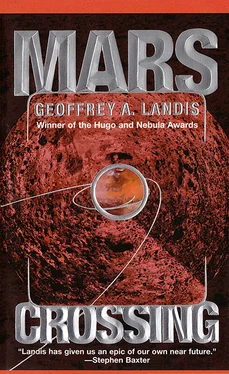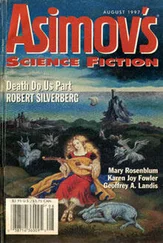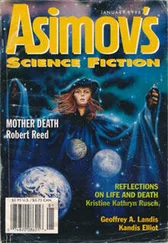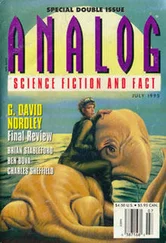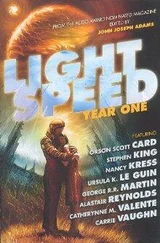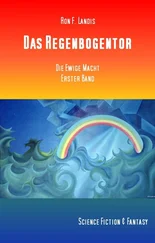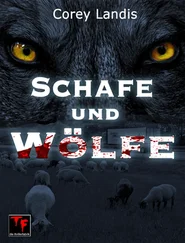“ Agamemnon or bust,” Ryan echoed. “Okay. Let’s get a move on!”
Ryan Martin could not even remember a time when he had not wanted to be an astronaut. He could remember being six, and riding on his father’s shoulders. The Canadian night had been cool and clear, and he had leaned back and just gazed at the stars blazing above him, tiny lighthouses on the road to infinity. He could imagine that he was falling upward, endlessly falling among the stars, and thought, there. I’m going out there. He had leaned back, farther and farther on his father’s shoulders, and then let go, to feel himself falling upward.
His father had caught him by the legs before he hit the ground—his father had always had incredible reflexes—and all that he had felt was disappointment.
In the Scouts, he had been on the archery range. He hadn’t cared much about target shooting, and unlike the other boys, he had no secret longing to hunt and kill. But the bow itself seemed to him a thing of perfect beauty, an object that could not have been more elegantly designed. He marveled over its clean and simple design. One day he took his bow, drew it back as far as he could, and aimed it directly upward into the sky.
The arrow flew up, straight and true, and vanished with a whisper into the aching blue above, and he stared after it, his bow arm still extended in the air, mesmerized by the beauty of the flight.
“Martin!” the scoutmaster shouted. “What the hell are you—”
The arrow came down, so fast it was only a streak, and with a soft whickersnack buried itself to the feathers in the Earth.
The scoutmaster turned pale, his eyes bulging, and then he exploded. “Martin! Get over here!” He grabbed him, his fingers digging painfully into his shoulder, and ripped the bow out of his hands.
Ryan had almost forgotten he still held it.
None of the other boys had been watching when Ryan had launched his arrow skyward, and they all turned to stare, battled at the sudden inexplicable fury of the scoutmaster.
“You—you—” The scoutmaster was completely incoherent, and slowly, almost as if from a dream, Ryan came to his senses and realized, yes, it might have killed someone. It might have killed him. It had been a dangerous thing to do.
But in his mind’s eye he could still see it, that one perfect moment when the arrow hangs in the air, quivering, straining, longing to go higher, and then falls, defeated.
And he realized, that is me, the arrow is me. That is where I want to go.
To go upward, forever upward, and to never come down.
They were tired, and then more than tired, a complete weariness that transcended all consciousness. The world compressed down to one step, then another, then another. The landscape had changed color, darkening from the light, almost orange color of their original landing site to a dark burned-brick color. They were walking on bare bedrock. But none of them looked at the landscape, none of them focused any farther ahead than the next step.
Ryan kept a readout of their position using the inertial navigation system from the dirt-rover. Occasionally he would read out their progress—“Three hundred kilometers to go”—until at last Tana told him to stop; it was too depressing. None of them dared to think of what would happen if the inertial navigation failed, if they were unable to find the Agamemnon site as they had been earlier unable to find the Pathfinder.
Two hundred kilometers to go.
One hundred kilometers.
When they came to the edges of the Agamemnon camp, it took them several minutes before they even recognized it. A discarded drilling-lubricant cylinder. Not far past that, a seismic recording station. They were beyond curiosity now, and the technological detritus went unremarked.
They crested a dune, and started down the far side, and none of them looked up until they almost stumbled over the camp.
Agamemnon lay before them.
“We’re here,” Tana said, almost in a whisper.
Ryan looked up. “We’re here. It’s here!”
Estrela, trailing behind, echoed in a whisper, “Here. Here!”
The Agamemnon camp was spread out. The Agamemnon lander itself sat a kilometer off to the east, a squashed hemispherical shell sitting on its heat shield and surrounded by the shreds of its airbag cushion like a half-melted mushroom. Spread all around were the remains of the encampment: the abandoned fuel-manufacturing plant and its electrical generator plant; two bubble habitats, long deflated; a toolshed; a domed greenhouse module; a half dozen scientific stations; communications antennae; a sheet metal quonset hut; piles of trash and discarded equipment; electrical and data cables spread spaghetti-style across the ground. No one from the doomed Agamemnon had bothered to be neat; they were too worried about survival.
Every horizontal surface was covered with a layer of dust.
There was no hope that Agamemnon ’s electrical generating plant would still work, but the bubble habitats both seemed intact. Over the six years they had been on Mars the gas that had originally inflated them had slowly leaked away, but when Ryan checked, they were still intact.
Using the Agamemnon camp was a risk. If any of the original fungus had survived the six years on Mars and was still viable, and still virulent, they could face a repeat of the runaway infection that had ultimately led to the Agamemnon disaster. In theory it would not survive the six years without a host. In theory, even if it survived, it would not colonize healthy humans. In theory, even if it did, they had the pharmaceuticals to be prepared for it this time. In theory.
But they had little choice.
Ryan salvaged several solar array panels from the lander, and after cleaning away the dust layers, found them still functioning. It would be enough power to provide heat and light for the habitat.
And, if the transmitters still functioned, enough to communicate with Earth.
“We’ve got a new camp, crew,” Ryan announced. He should have felt triumph. Instead, all he felt was weary. “And it looks like everything still works.”
Through grade school Ryan had built model rockets, taught himself calculus and aerodynamics, built his own telescope and a special tracking platform for it so he could watch the Russian space station Mir when it passed overhead and plan for the day when he, too, would be up there, looking down on Canada from above. In high school his science fair project, a gyroscopic stability system for a model rocket, had won a prize and a scholarship, enough that, along with earnings from an outside job programming computers to recognize speech, he could afford to go to MIT.
To Ryan, being an undergraduate at MIT had been like being at a banquet with each course more appetizing than the last. Finally he was stimulated to stretch his limits, and sometimes to exceed them.
At the end of his freshman year, Ryan got involved with a project to fly a student-designed satellite. He volunteered for the task of building the control system. It was a small but intensely dedicated team.
They had two unofficial mottoes. The first was, “It doesn’t have to be good—it does have to be done.” The second was, “We don’t need no stinkin’ sleep!” Everybody else called them the satellite gang, but to one another, they were the Minions of the Satellite God. They made a pact with each other: The satellite came first. Everything else—their sleep, their health, their grades, their lives—came second.
Their satellite flew as a secondary payload on a Delta rocket, hitchhiking its way into space with a free ride on the third stage of a rocket whose main mission was to put a communications satellite into geosynchronous orbit. The entire gang went to Florida for the launch, crammed into a battered Volvo station wagon. They stayed, eight of them in one room, at a cheap hotel on Cocoa Beach. It was the first time Ryan had ever been so far south.
Читать дальше
